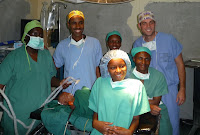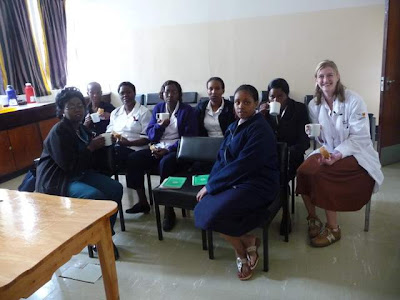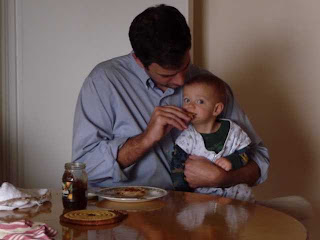Workng at Kijabe has helped to more solidly confirm my desire to do additional training in pediatric surgery after finishing surgery residency. I love taking care of these children, and during the past six weeks at Kijabe, there have been a few to whom I was particularly attached. One of those children is named Paul. Paul is a twelve year old who had spina bifida and scoliosis. He is paraplegic and has come to us because of pressure ulcers on his buttocks, thighs, and knees. When he arrived, he was anemic and malnourished, and his wounds were infected. With a lot of wound care and (more importantly) a cow-ful of milk, he has gained strength and his wounds are clean. He has been in the hospital almost the entire time I was in Kijabe, and on Friday we grafted his wounds. I am hopeful that they may heal.
 This morning, I stopped by to see Paul on my way out of the hospital—to say goodbye. He and his brother, John, listened as I told them that I was leaving and that I wanted them to stay strong—Kaa ngumu!, I told them. Paul’s brother, John, is eighteen years old and has been at his brother’s bedside, caring for all of his needs, every day for the last month or more. He tends Paul’s wounds, plays games with him, carries him outside on a cart, and cleans him when he soils himself. I told John that he is a good brother—and a good man. I told them both to continue working at getting an education. I told them I was leaving today. John asked me when I would be back, and I told him that it would be a long time. ‘A long time?’ he asked. Like 5 years, I told him. 'Like 5 years' he said, somewhat bewildered and questioning. I explained to him that I was going home-- or back to the States rather-- and that I didn't know when I would be back in Kijabe. We talked for a little while longer; I prayed for them both and left.
This morning, I stopped by to see Paul on my way out of the hospital—to say goodbye. He and his brother, John, listened as I told them that I was leaving and that I wanted them to stay strong—Kaa ngumu!, I told them. Paul’s brother, John, is eighteen years old and has been at his brother’s bedside, caring for all of his needs, every day for the last month or more. He tends Paul’s wounds, plays games with him, carries him outside on a cart, and cleans him when he soils himself. I told John that he is a good brother—and a good man. I told them both to continue working at getting an education. I told them I was leaving today. John asked me when I would be back, and I told him that it would be a long time. ‘A long time?’ he asked. Like 5 years, I told him. 'Like 5 years' he said, somewhat bewildered and questioning. I explained to him that I was going home-- or back to the States rather-- and that I didn't know when I would be back in Kijabe. We talked for a little while longer; I prayed for them both and left.In the Western world, we spend thousands of dollars on sound equipment for music in our churches, and we worry about whether the music is just right. But there is no sweeter sound than hymns filling the hallways of a hospital. Perhaps it is just the acoustics, but I think it’s the juxtaposition of faithful praises and deep suffering that is so profound. We sing, for the most part, when we are joyful and satisfied. Here, the songs of satisfaction come from the mouths of the suffering and oppressed and those who are caring for them. The hymns insist that their singers' satisfaction is elsewhere, that their thirst is slaked by a different spring of hope and rest.
Sunday morning, the hymns had a slightly different message for me: I was sitting at the nurses' station writing a frustrated note about an ultrasound that had not been done despite multiple calls, repeated orders, etc. The only reason for the omission was laziness, and I was angry about it. Unfortunately, some of my frustration was finding its way into the chart in a somewhat masked way-- inside I was fuming. Half-way through my scribblings, I heard angelic music coming from the doors. In burst Mercy and about 30 of her 'disciples', a group of women whose children have been treated at Bethany Kids Kijabe and now come back on occassion to minister to the parents of children in the hospital. They were happily singing "We are soldiers, we are soldiers. We are soldiers in the army of the Lord," as they marched right up to the nurses desk, where I sat in my frustrations, letting the vitriole spill on the page. They might as well have been singing "You're a sinner; You're a sinner. You're a sinner in the middle of the ward." I smiled and waited for them to leave, although I was a little less eager to let the radiographer know he was a lazy sluggard.
This morning, as I walked from Paul's bedside to the theatre to say goodbye to the OR staff, the voices of nurses at their morning devotions filled the resonant halls. What was conviction and accusation yesterday had become sweet again, and it added to the sense that this was a significant moment in my life.
 In the OR, I told the staff and other residents goodbye, shaking hands around the room, then made my way back to the Sitaplex, where Amelia had finished packing our bags. We said a few more goodbyes, including to Helen, Josiah's nanny, whom we will deeply miss.
In the OR, I told the staff and other residents goodbye, shaking hands around the room, then made my way back to the Sitaplex, where Amelia had finished packing our bags. We said a few more goodbyes, including to Helen, Josiah's nanny, whom we will deeply miss. When our driver arrived, we loaded the van and began the long, dusty journey toward home.
























 Nairobi Time
Nairobi Time